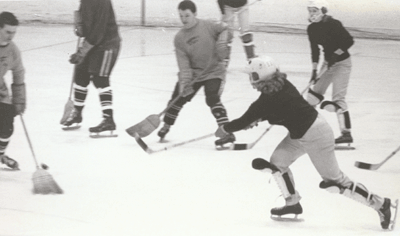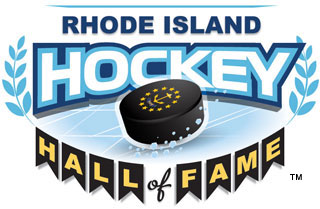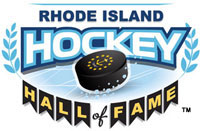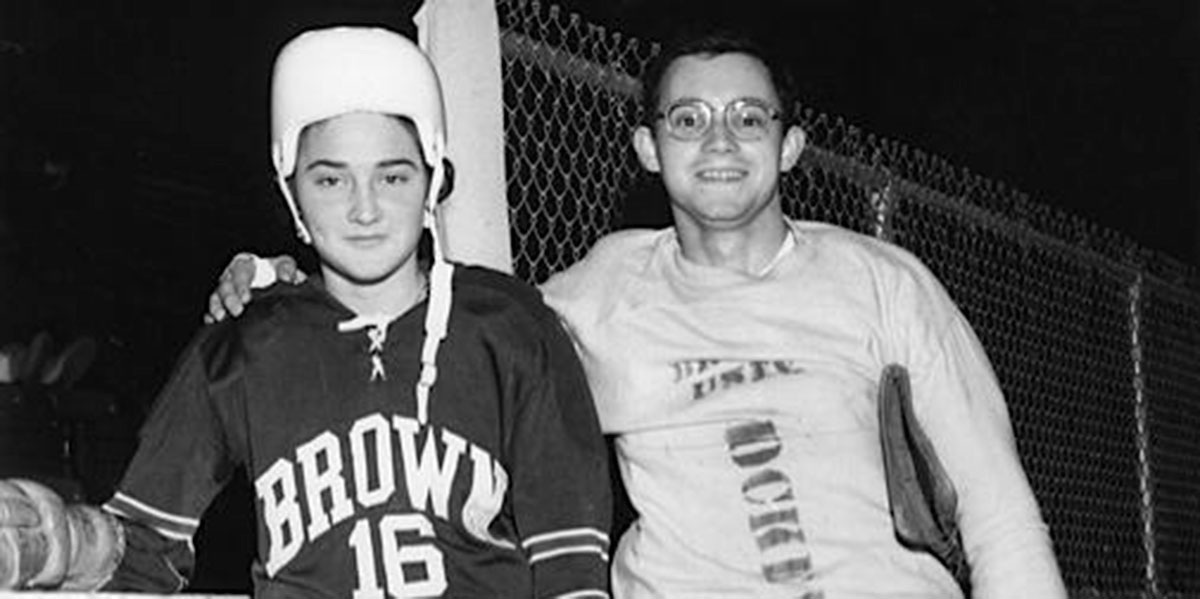In the Fall of 1964, Brown University’s men’s hockey coach, Jim Fullerton, cleverly arranged for Nancy Schieffelin ’67, an experienced hockey player enrolled at Pembroke, the coordinate women’s college for Brown, to join a team practice disguised in full uniform. The exercise was to show the men’s team how well a woman could play. An impressed Brown goaltender, senior John Dunham, posed with Schieffelin after the historic practice.
The demonstration led to interest in hockey by other female students and, with the University’s support, the eventual formation of the first women’s college ice hockey program in the United States.
 Under the leadership of “Founding Mother” Schieffelin, about twenty Pembroke students learned team hockey by practicing with the men. They raised their own funds for uniforms and equipment. One fundraiser was a game against the men’s JV team, who played with brooms.
Under the leadership of “Founding Mother” Schieffelin, about twenty Pembroke students learned team hockey by practicing with the men. They raised their own funds for uniforms and equipment. One fundraiser was a game against the men’s JV team, who played with brooms.
In February 1966, Pembroke lost 4-1 to the Walpole Brooms. Two weeks later, an improved squad narrowly lost 2-1 in a sudden-death rematch. Impressed by the fact that 300 people had come out on a Sunday evening to watch the game, the Brown Daily Herald, in an editorial on March 9, announced that Pembroke hockey had come of age and the team was in need of a suitable name.
Dismissing “Cubs,” which was already used for men’s freshman teams, the Herald suggested “The Pembroke Pandas,” which sounded feminine, provided the proper alliteration, and “fits nicely into almost any headline space.” In a letter to the editor of the Herald on the next day, the Pembroke hockey team accepted its new name.
For a while Pembroke had the only women’s ice hockey team in the United States and its only competition was with Canadian teams. The Pandas ventured into international competition in January of 1968 in Kingston, Ontario, where they lost 10-1 to the amateur Humberside Omegas and then 4-1 to the Golden Gaels of Queen’s University.
Throughout the early years, the Pandas used their contacts to encourage women’s teams to start in other American colleges. They improved their own prospects along the way with the enrollments of Linda ’68 and Janet Fox ’70 from Canada, and Allison McMillan ’74 and Martha Schmitt ’76 from Minnesota.
The Pandas tied with Cornell for the Ivy League championship in 1981 and won it outright in 1985. Amy Crafts ’81 was a four-time All-Ivy selection from 1979 to 1982. In their first ECAC tournament in 1985 the Pandas lost to the University of New Hampshire in the first round, while Mardie Corcoran ’86 was named ECAC player of the year. The next year, led by Corcoran and Lisa Bishop ’86, Brown enjoyed an undefeated Ivy League season, but lost in the finals of the ECAC tournament to the UNH.
In 1989, Cranston, RI’s, Margaret DeGidio Murphy took over the reigns of the team, the first of 18 years at the helm. Between 1994 and 2000, “Digit” would lead her team to 5 ECAC titles and an NCAA Championship runner-up finish in 2002. During the Bears’ 2006-07 season, a 3-1 victory over Boston University made Murphy the most victorious coach in Division I women’s hockey history.
Over her tenure, Murphy developed seven Olympians, including Katie King-Crowley and Tara Mounsey, who combined with seven Providence College teammates to help the USA capture the gold medal in the 1998 Nagano Olympics.
You’ve come a long way, baby.
Posted by RIHHOF


